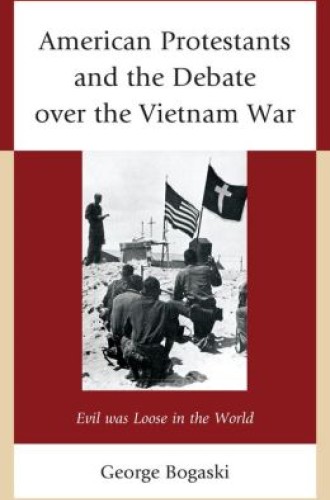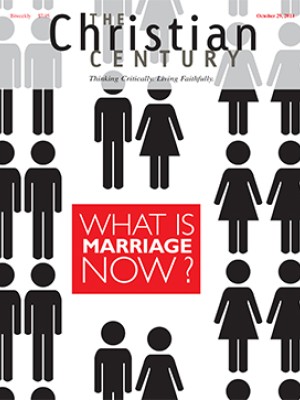American Protestants and the Debate over the Vietnam War, by George Bogaski
How did America’s Protestant leaders respond to the Vietnam War? Historian George Bogaski wisely adopts a comparative approach in his three-part analysis of denominational statements about what is arguably the most debated military conflict in recent American history. Focusing on both polity and theology, Bogaski produces an illuminating, if also unvarnished, story of prophets, priests, and bystanders. Mainline, evangelical, and black church leaders receive separate case studies.
The mainline Protestant narrative looks familiar at first glance: an antiwar denominational leadership is increasingly divorced from the silent majority in the pews. Bogaski does not challenge the thesis of mainline decline, which recent works have tweaked, but he does introduce some interesting wrinkles into it. His focus is not on William Sloane Coffin and other liberal stars, but instead on denominational officials and agencies whose march to the vanguard was gradual. Full-fledged opposition to American involvement in Vietnam came almost five years after the start of escalation. Even then, mainliners were mostly squeamish about supporting conscientious objection. Many thought at least notionally in terms of just war theology; they were not pacifists. However, the just war tradition proved too elastic to assist in “reaching moral judgment and resolution” in the case of Vietnam. The “office of the prophet” was a more direct means to this end. But alas, Bogaski notes, it served to alienate the laity as much as educate it.
Read our latest issue or browse back issues.
Bogaski offers an intriguing survey of conservative mainliners who chafed at liberal activism but were not prepared to depart for evangelical pastures. The general debate over the Vietnam War often played out as a dispute about the propriety of dissent itself. That issue, in turn, was a spillover from arguments over the civil rights movement. One’s position on the advisability of civil rights protests usually foretold one’s stance on antiwar marches. Mainline leaders’ support for the cause of civil rights opened the door for assertive opposition to the war. Meanwhile, conservatives transferred their discomfort with civil rights demonstrations to antiwar activism. Looming over all of these issues was the question of whether denominations should engage politics at all. In these years before Jerry Falwell, the assumption was that church politics were liberal by default. That assumption was not accurate. Most theological conservatives in Bogaski’s book appear to have been political conservatives, too.
Like political conservatives as a whole, evangelical conservatives were by no means the driving force behind what most Americans saw as Lyndon Johnson’s war. Yet they helped to sustain what became Richard Nixon’s war. “As far as the Vietnam War was concerned,” writes Bogaski, “conservative evangelicals made their judgments with confidence.” Bogaski brings special energy to this section, the longest of the three. His book benefits from a wealth of editorial cartoons that appeared in Baptist, Holiness, and Pentecostal publications. These and other sources are notable for their “affirmation of the normalcy of war.” Bogaski stresses the glaring absence of concern over the bomb in conservative evangelical circles, while most other Protestants found little spiritual comfort in the prospect of apocalypse.
Bogaski goes to great lengths to be fair to conservative supporters of the Vietnam War, but he finds a lack of reflection that might surprise even the most cynical of readers. The familiar evangelical tendency to pit soul-saving against activism concealed an entrenched bias in favor of the war itself. As the war became increasingly controversial within society at large, conservative evangelical support for it became more defensive, focusing especially on the need to protect missionaries and fellow Protestants in Vietnam. As late as 1972, some Baptists saw “revival coming to Vietnam”—a new spin on the logic of destroying the village in order to save it. Bogaski does touch on the nascent evangelical left, which reacted strongly against such glib assurances. Still, just as evangelical progressives drifted toward Anabaptist pacifism, the Assemblies of God shed the remaining vestiges of its historical peace stance.
In a brief but essential final chapter, Bogaski argues forcefully that African-American denominational leaders exhibited “a general silence” regarding the Vietnam War. Specifically, they kept their qualms off the record during the presidency of Johnson, who had championed and signed landmark civil rights legislation. Stronger criticism came when Nixon entered the White House, and even then it “was directed not so much at his foreign policy as at the threat he posed to Great Society domestic reforms.”
Here we see another way in which the legacy of the civil rights movement informed responses to the Vietnam War. Johnson’s support for civil rights trumped his policy of escalation. Martin Luther King Jr. famously broke from Johnson, of course, but the increasingly radical minister was hardly a mainstream cleric by the latter half of the 1960s. Bogaski seems taken aback by the degree of black Protestant resistance to King’s attempt to bridge the civil rights and antiwar movements, yet he ably explains the political and sociological forces underlying it. Black involvement in the two-party system has always involved such pragmatic trade-offs, and keeping Johnson close was an understandable priority. Bogaski’s analysis is a reminder that contrary to some contemporary assumptions, most black congregations were not fonts of the social gospel during the civil rights struggle.
Unfortunately, this carefully researched manuscript is often a bumpy read. It would have benefited from more fastidious editing. Some readers will not be forgiving of the book’s numerous typos and Bogaski’s confusing use of semicolons. Perhaps these and other minor errors can be corrected in a more affordable paperback edition.
The author closes on a theological, even pastoral note. He considers how church leaders might approach the pressing matters of their times. Prophets “must first learn to connect with those they seek to awaken from moral slumber,” while priests should “not so quickly yield this world to Caesar, or the Devil.” Bogaski is harder on the priests. To be sure, he chides mainline officials for their impatience and black church leaders for their reticence, but only evangelical conservatives come under fire for the content of their beliefs. One senses that Bogaski is sending a message here: moral clarity is sometimes another form of cheap grace.







